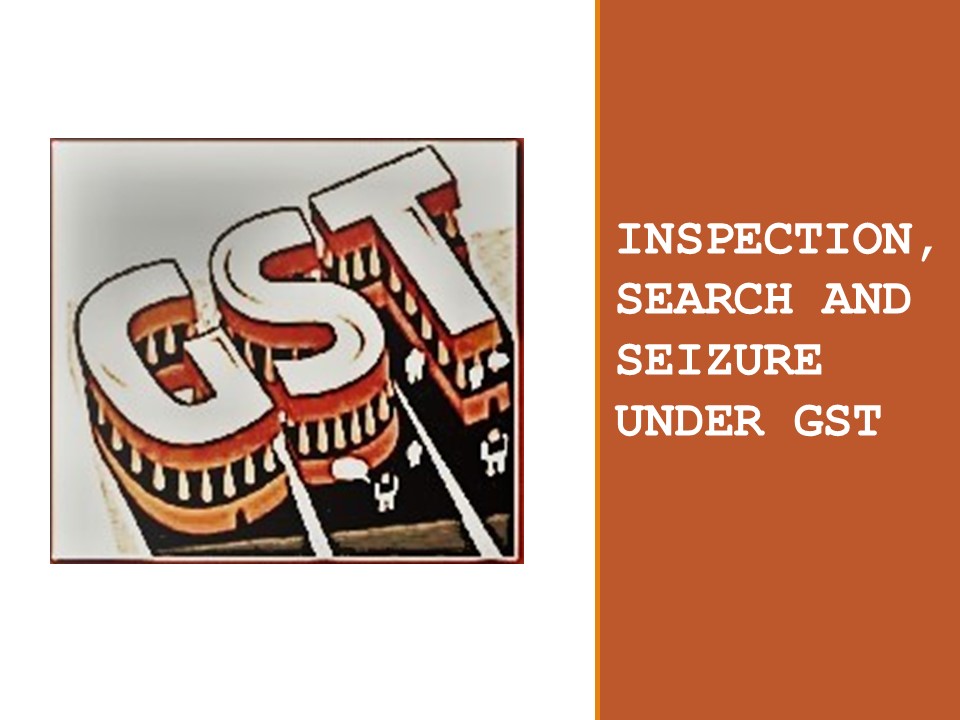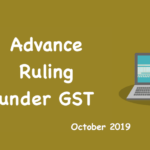Introduction
The provisions of Inspection, Search and Seizure are not newly inserted provisions in the GST law. The same are age old provisions inbuilt in almost all the taxation laws of the Country. The erstwhile Central Excise and Service Tax law had also such provisions to catch hold of the tax evaders. But under GST law, such provisions have presently become more important in view of the menace of fake invoices and bogus claim of ITC. The powers conferred for taking such stringent steps are executive and exceptional in nature which is always a strong weapon in the hands of the tax department.
The constitutional validity of the provisions of Search and Seizure were challenged before judiciary on several occasions on the ground of interference to one’s freedom, personal liberty, privacy and violation of the fundamental rights etc. But on all the occasions the Court rejected the contention and upheld the validity of such provisions as a deterrent against the evaders.
Powers of Inspection, Search and Seizure under GST law
The provisions of Inspection, Search and Seizure are enshrined under section 67 & 68 of the Central Goods and Services Tax Act, 2017. The corresponding rules framed thereto are Rule 139 & Rule 138-138D. However, the author in the instant article has tried to discuss the provisions of section 67 and corresponding rules thereto.
Theme of Section 67:
The key provisions can be summarized as follows:
| Section | Extract of relevant provision | Relevant Form |
| 67(1) | There must be a reason to believe that there is a suppression of transaction and evasion of tax. | FORM GST INS-01 – Authorization for Inspection or Search |
| 67(1) | Such reason to believe must be by Proper officer not below the rank of Joint Commissioner. | |
| 67(1) | He either himself or may authorize any officer to Inspect any places of business of taxable person. | |
| 67(2) | He either himself or may authorize any officer to Search and Seize goods, documents, books or things which are secreted in any place. In case where it is not practicable to seize any goods he may order for non-removal of goods without prior permission. He may retain documents, books or things so seized for so long as may be necessary for examination. | FORM GST INS-02 –Order of seizure FORM GST INS-03- Order of Prohibition |
| 67(3) | The documents or things which are not relied upon by him shall be returned within a period of 180 days of the issue of notice. | |
| 67(4) | Where access to premises, almirah, electronic device, box or receptacle is denied he may seal or break upon the door of premises, open almirah etc. in which goods or accounts are concealed. | |
| 67(5) | Copies of documents seized shall be provided except where he believes that making such copies may prejudicially affect investigation. | |
| 67(6) | Goods seized shall be released on provisional basis with such bond or security which covers applicable tax, interest and penalty. | FORM GST INS-04- Bond for release of goods seized |
| 67(7) | Once goods are seized he must give notice within 06 months of seizure to the tax payer and if it is not done then the goods shall be returned to the person from whose possession seized. However, the period of 06 months may be extended further by 06 months. | |
| 67(8) | In case of perishable or hazardous nature of goods the same may be disposed off immediately after seizure as per the notification by the Govt. | FORM GST INS-05-Order for release of goods /things of perishable or Hazardous nature |
| 67(9) | He shall prepare an inventory of perishable or hazardous goods in such manner as may be prescribed. | |
| 67(10) | The provisions of Code of Criminal Procedure, 1973 relating to Search and Seizure shall be applied and the word ‘Magistrate’ in section 165(5) of the CCP, 1973 shall be substituted by the word ‘Commissioner’. | |
| 67(11) | The proper officer may for the reasons to be recorded in writing seize the accounts, register or documents produced before him by any person who has evaded or attempting to evade payment of tax and shall retain such documents for so long as may be necessary for the proceedings under the Act or rules made there under. | |
| 67(12) | The Commissioner or any officer authorized by him may cause purchase of any goods or services from the taxable person to check the issue of tax invoice, bill of supply by such taxable person and on return of goods so purchased by officer the taxable person shall refund the amount after cancelling any tax invoice or bill of supply issued by him. |
Reason to believe
The term ‘reason to believe’ is not defined under the GST law. It is not only a foremost condition to be satisfied before authorizing /conducting the search rather it is also a foundation upon which the whole proceeding is built upon.
As per Section 26 of the IPC, 1860 -“A person is said to have ‘reason to believe’ a thing, if he has sufficient cause to believe that thing but not otherwise.”
“Reasons are the links between materials on which certain conclusions are based and actual conclusions. They disclose how the mind is applied to the subject-matter for a decision whether it is purely administrative or quasi judicial. They should reveal a rational nexus between the facts considered and the conclusions reached. Only in this way can opinions or decisions recorded be shown to be manifestly just and reasonable.” Union of India v. Mohan Lal Kapoor & Ors. (1973) 2 SCC 836 (SC)
The word ‘believe’ is much stronger than the word ‘suspect’. Reason to believe is not the same thing as “reason to suspect”. Indian Oil Corporation v. ITO (1986) 159 ITR 956 (SC)
In a most recent case of Rimjhim Ispat Limited v. State of U.P. [2019] 103 Taxmann.com 254 (Allahabad) the petitioner challenged the powers exercised by the tax department u/s 67 of the U.P. GST Act, 2017. But the Hon’ble Court observed that, it is essential that the officer authorized to carry out the search should have ‘reasons to believe’ which should be based on reasonable material and should not be arbitrary. However, the reasons may or may not be communicated but the same should exist on record. In this case the Hon’ble Court refrain itself from going into the sufficiency or adequacy of such reasons.
Thus what emerges from the above discussion is that the Joint commissioner and the authorities before the issue of search warrant should have tangible reasons and should be in possession of honest belief and not mere suspicion. There are a plethora of decisions in support of this contention which are not reproduced here for want of space. Needless to say the absence of “reasons to believe” would invalidate the search proceeding.
Authority who can Search
The GTS law is very loud and clear that the ‘reason to believe’ must be recorded by the proper officer not below the rank of Joint Commissioner. He may further authorize any officer to inspect, search or seize the premises. Further section 67(11) authorizes Proper Officer to seize accounts, registers etc. produced before him by any person.
But practically we face that Inspectors and other subordinate staffs of the tax department also enter, search and seize. Are they really authorized under the law?
Section 3 of the CGST Act, 2017 has an exhaustive list of officers under the Act. Further section 4 authorizes Board to appoint such person as officers under the Act as it may think fit. In this regard the author has not come across any specific provision/notification under the Central Act and therefore has serious apprehensions about the fact whether the Inspector of Taxes is an authorized officer under the Central GST Act? However, the Assam State Govt. has notified the jurisdiction of State officers vide notification no.304 dated: 22.06.2017 whereby Inspector of Taxes is also notified as officer u/s 4(2) of the Assam GST Act, 2017. Similarly, the other States should have also issued notifications in the same line. So this again creates a doubt whether Inspector appointed under the State Tax has the authority to enter into premises etc for the purpose of section 67? The author finds that there is no such clear cut authority provided except under section 6 for cross empowerment but that too seems to be ambiguous.
In a recent case of Pioneer Cooperative Car Parking Servicing and Construction Society Ltd. v. State of West Bengal [2019] 106 taxmann.com 391 (Calcutta)the petitioner challenged the search conducted by the GST authority who was below the rank of Joint Commissioner and the Hon’ble Court directed not to take any coercive process for realisation of GST for municipal lots, which was prima facie not payable.
Secreted in any place
The next condition for a valid search is that some documents or book or things are secreted in any place and the authority is of the opinion that they are relevant or useful to proceedings under the Act. The meaning of the word “secreted” is very important here since if books etc are not secreted in any place then such books etc cannot be the subject matter of the search warrant.
The Hon’ble Supreme court had an occasion to discuss the meaning of the term in Durga Prasad v H.B.Homes, Supt (prev) Central Excise- 1983(13) ELT 1501. The court held that the meaning of the term “secreted” should receive a contextual meaning and means “documents which are kept not in the normal or usual place with a view to conceal them’ or it may even mean `documents or things which are likely to be secreted’. In other words, documents or things which a person is likely to keep out of the way or to put in a place where the officer of law cannot find it.” This decision of the Hon’ble Court is squarely applicable to searches under the CGST Act, 2017 since Court in that case was interpreting section 105 of the Customs Act 1962 which is almost similarly worded.
In the light of the above discussion, it is to be concluded that the search should be at a place where a reasonable person would expect that such a place is likely to be used as a hiding place where the hands of law may not in the normal course would reach. Hence an office or work place cannot be said to be a place where one can expect documents, books etc to be secreted or concealed.
Copies of seized documents – Legal Right of taxable Person
Under the provisions of section 67(5) the officer is duty bound to provide the copies or extracts of the seized documents to the person from whose custody the same are seized. However, this section also put a bar on providing such copies where the officer is of the opinion that making such copies may prejudicially affect the investigation. Thus the department will always try to avoid providing on the plea of prejudicial to revenue. So, here, a question arises as to what makes the officer to believe that making of copies may prejudicially affect the investigation?
The author believes that where documents seized are of such nature that the facts and figures contained therein are already on record or reported either through tax returns submitted by taxable person or through some other means then there is no harm in sharing such documents. However, where the seized documents are not already accounted for by the tax payers anywhere and making copies may give a chance to the tax payer to manipulate record or enter transactions freshly in regular books or to induce parties listed therein then the officer can deny the same. The said provision is also challenged recently in Bombay High Court in case of High Ground Enterprises Ltd v. Union of India [2019] WP 8075 (Bombay) wherein it was argued that the opinion, which would be a decision, should be reflected in the record. The opinion cannot be a mere ipsi-dixit of the Proper Officer. There must be cogent reasons to withhold giving of copies to the person. A mere statement that it will prejudicially affect the investigation would be only chanting the language of the section. Further Section 67(5) of the Act creates a right to receive the copies by a person from whose custody the documents are seized. The said person need not give justification why he needs the copies of the documents seized.
Statement of family members through coercion not allowed
In case of Paresh Nathalal Chauhan Vs. State of Gujarat reported in 2019 TIOL 2472 HC AHM GST the Hon’ble Gujrat High Court held that section 67(2) does not empower the officer concerned to record statement of family members through force or coercion or to record their conversations in mobile phone. It is not permissible for the authorized officer to use coercive measures against family members to find out the whereabouts of the taxable person. The court also observed the glaring abuse of law and recorded the same in the following words-
“It is shocking to see that in a premises where there are three ladies, namely, the petitioner’s mother, wife and young daughter, male officers together with a CRPF officer have stayed throughout the day and night despite the fact that the goods, articles and things were already seized on 11.10.2019”. Entire exercise carried out by the officers from 12.10.2019 to 18.10.2019 was totally without any authority of law and in flagrant disregard of the provisions of the Act and the rules and in total abuse of the powers vested in them under the Act. The Court ordered for proper enquiry on the action of the officers.
Provisions of Code of Criminal Procedure, 1973 to be applied
Section 67(10) envisages that the provisions of the Code of Criminal Procedure, 1973 relating to search & seizure shall be applied to search under this section. It means wherever there is violation of such provisions the search conducted may be declared as illegal. In case of Commercial Tax officer, Benz Circle, Vijayawada and others v. R.M. Motor (P) Ltd.[2007] 005 VST 0459it was held that if the procedure is not followed in seizing the accounts, registers or others documents, the seizure becomes illegal.
Complete Sealing of premises not permissible
In case of Napin Impex (P.) Ltd. v. Commissioner of DGST, Delhi [2018] 98 taxmann.com 462 (Delhi) it was held that where Competent Authority had completely sealed business premises of assessee on account of non-production of account books and other documents, complete sealing was illegal u/s 67(4).
Goods accounted for in regular books cannot be seized
In case of Golden Cotton Industries v. Union of India [2019] 102 taxmann.com 412 (Gujarat) the matter before the Court was that the goods in respect of which the impugned order of prohibition under rule 139(4) of the rules has been issued, are the goods which are accounted for in the books of account and are not secreted anywhere, and hence, the order of prohibition is contrary to the provisions of sub-section (2) of section 67 of the Act. The Court issued notice to the authorities.
Goods cannot be detained in case of bonafide dispute about tax rate
In case of Jeyyam Global Foods (P.) Ltd. v. Union of India [2019] 103 taxmann.com 108 (Madras)the Court held that Inspecting Squad Officer is not entitled under section 67 read with section 129 to detain goods or vehicles where there is a bona fide dispute as regards exigibility of tax or rate of tax.
In similar matter in case of N.V.K. Mohammed Sulthan Rawther & Sons and Willson v. Union of India [2019] 101 taxmann.com 24 (Ker.) The Hon’ble Kerala High Court held that in such cases at best the inspecting authority can alert the assessing authority to initiate the proceedings “for assessment of any alleged sale, at which the petitioner will have all his opportunities to put forward his pleas on law and on fact.” The process of detention of the goods cannot be resorted to when the dispute is bona fide, especially, concerning the exigibility of tax and, more particularly, the rate of tax.
Under the erstwhile law of sales tax also this issue was considered by Judiciary on several occasions. In case of Goyal Motor Parts v. State of Punjab and another (2011) 38 VST 159 it was held that the nature of transaction can be determined only by the assessing authority. It is only the Assessing authority who can decide this question. On being determined the nature of goods, the rate of tax as applicable thereto would be decided. The officers carrying out checking on the roadside in exercise of powers conferred upon them under Section 51 of the Punjab Value Added Tax Act, 2005 cannot go into the disputed question of taxability.
Conclusion:
The above discussion makes it amply clear that the provisions of Inspection, Search and Seizure are of paramount importance to safeguard the revenue. Thus the same has to be used with utmost care and due diligence. A minor mistake on the part of the seizing officer may lead the whole proceedings illegal. At the same time due care must be exercised to avoid unnecessary abuse of powers by the authorities. The concerned authority must always keep in mind that Powers, Duties and Responsibilities are to be used simultaneously to work in a dignified manner for the betterment of the nation.
*The author is a practicing Chartered Accountant at Guwahati and can be reached: manoj_nahata2003@yahoo.co.in.



